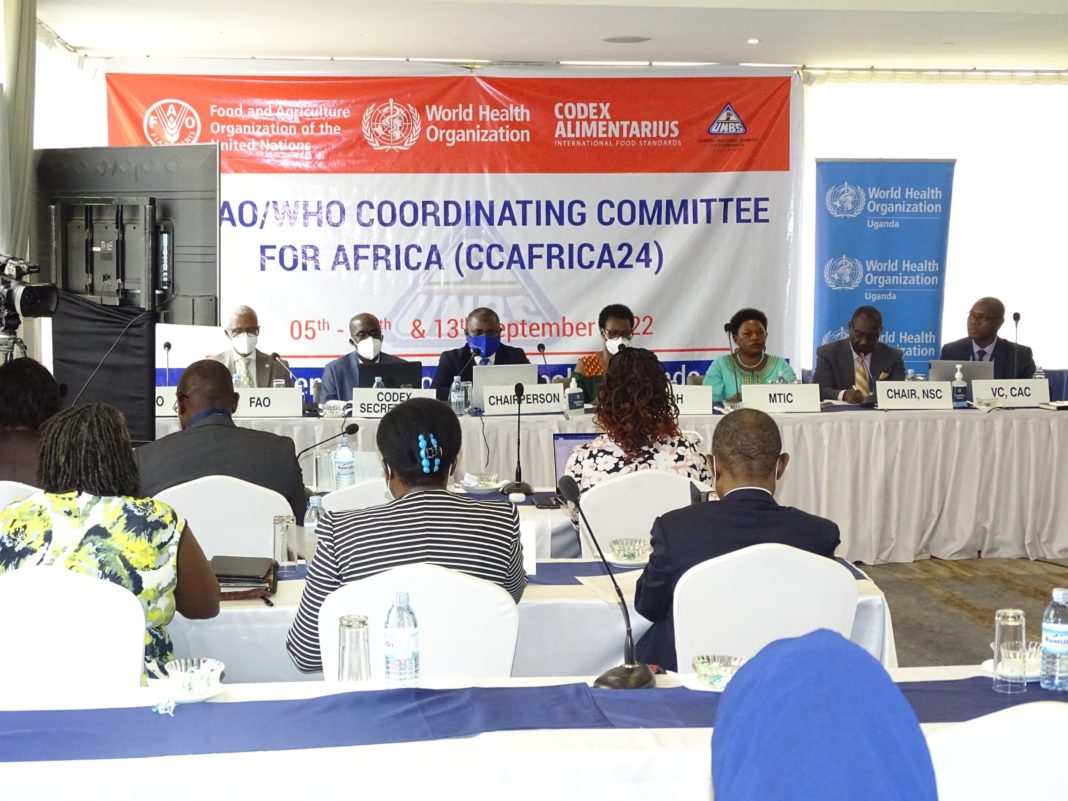Uganda National Bureau of Standards (UNBS) on behalf of Uganda is hosting over 250 delegates from 49 African Countries and other global Partners for a Week-Long Hybrid International Conference to discuss Strategies for Strengthening Food Safety in Africa.
Uganda is currently the Coordinator and Chair of the Food and Agriculture Organization (FAO)/World Health Organization (WHO) CODEX Alimentarius Commission, Coordinating Committee for Africa (CCAFRICA).
CODEX Alimentarius Commission was established by the Food and Agricultural Organisation (FAO) and the World Health Organisation (WHO) in 1963 and is charged with the development of International Food Standards in order to promote the Quality and Safety of Food, with the aim of protecting Consumers’ Health and ensuring Fair Trade Practices in the Food Value Chains. CODEX is currently comprised of 188 Member Countries and the European Union (EU). Uganda National Bureau of Standards (UNBS) is the CODEX Contact Point in Uganda.
Other key Ministries, Departments, and Agencies that are involved in Food Safety Control Systems and are involved in CODEX Activities in Uganda include the Ministry of Health (Chair of the National CODEX Committee), Ministry of Agriculture, Animal Industry and Fisheries (MAAIF), Ministry of Trade, Industry and Cooperatives (MTIC), National Drug Authority (NDA), Dairy Development Authority (DDA(, Uganda Coffee Development Authority (UCDA), National Water and Sewerage Corporation (NWSC) and Government Analytical Laboratory (GAL). Others are representatives of Consumer Organizations, Academia, Research, Civil society, and the Private Sector.
According to the World Health Organisation (WHO), the impact of consuming Unsafe Food on Public Health remains significant in the African Continent, with more than 91 Million people falling ill and over 137, 000 deaths occurring annually.
“In order to effectively address the Food Safety challenges, there is a need to strengthen National Food Control Systems that are forward-looking, people-centered, and cost-effective, covering both the formal and informal food sectors. Future improvements in Food Safety and Public Health will also largely depend on how sectors manage to collaborate using the One Health approach” said Dr. Bayo Segun Fatunmbi, from the World Health Organisation Uganda Country Office.
Mr. David Livingstone Ebiru, the Executive Director of the Uganda National Bureau of Standards (UNBS) observed that the majority of African Economies which majorly dependent on Food and Agriculture must deploy strong Food Safety Control Systems in order to promote trade and consumption of safe food, both within the Continent and beyond. He encouraged the African Partner States to adopt and harmonize relevant Food Safety Standards in order to facilitate seamless trade within the African Continental Free Trade Area (AfCFTA), on the basis of One Standard, One Market.
The engagement comes at a time when the African Regional Blocks such as The East African Community (EAC), the Common Market for East and Southern Africa (COMESA), Southern African Development Community (SADC), Intergovernmental Authority on Development (IGAD), and the Economic Community of West African States (ECOWAS) are coming together to form one big market under the African Continental Free Trade Area (AfCFTA).
Mr. Charles Musekuura, the Chairman of the UNBS National Standards Council (NSC), pledged to continue prioritizing CODEX and other International Standardization Activities in the Bureau’s Work Program given that UNBS is both a Member of CODEX, International Standardization Organization (ISO), African Regional Standards Organization and other Regional Standards Bodies.
The ongoing Conference is being Chaired by Mr. Hakim Mufumbiro from Uganda National Bureau of Standards (UNBS) as Coordinator of the CODEX Coordinating Committee for AFRICA (CCAFIRCA) and will be discussing the following aspects; Food Safety and Quality Situation in Africa, Draft Regional Standard for Dried Meat, Draft Guidelines for developing Harmonized Food Safety Legislation for the CCAFRICA Region.








